Nursing Ethics Reflection: CNA153 Foundations of Practice Report
VerifiedAdded on 2022/10/04
|8
|2308
|368
Report
AI Summary
This report presents a reflection on a nursing ethics case study, focusing on a scenario where a student nurse observes a registered nurse violating ethical guidelines regarding sharps management. The student analyzes the situation using Driscoll's reflective model, exploring the ethical complexities, including the importance of following safety protocols, professional conduct, and the impact on patient and nurse safety. The reflection delves into the student's emotional response, the registered nurse's actions, and the broader implications for workplace ethics and patient care. The student discusses the violation of ethical principles, the importance of effective communication, and the need for a supportive work environment. The report also addresses the student's personal feelings, the registered nurse's behavior, and the overall impact on the student's learning experience, advocating for improved communication, adherence to ethical guidelines, and a safe working environment. The student references relevant literature to support the analysis and concludes by highlighting the importance of speaking up against unethical practices to ensure positive patient outcomes.
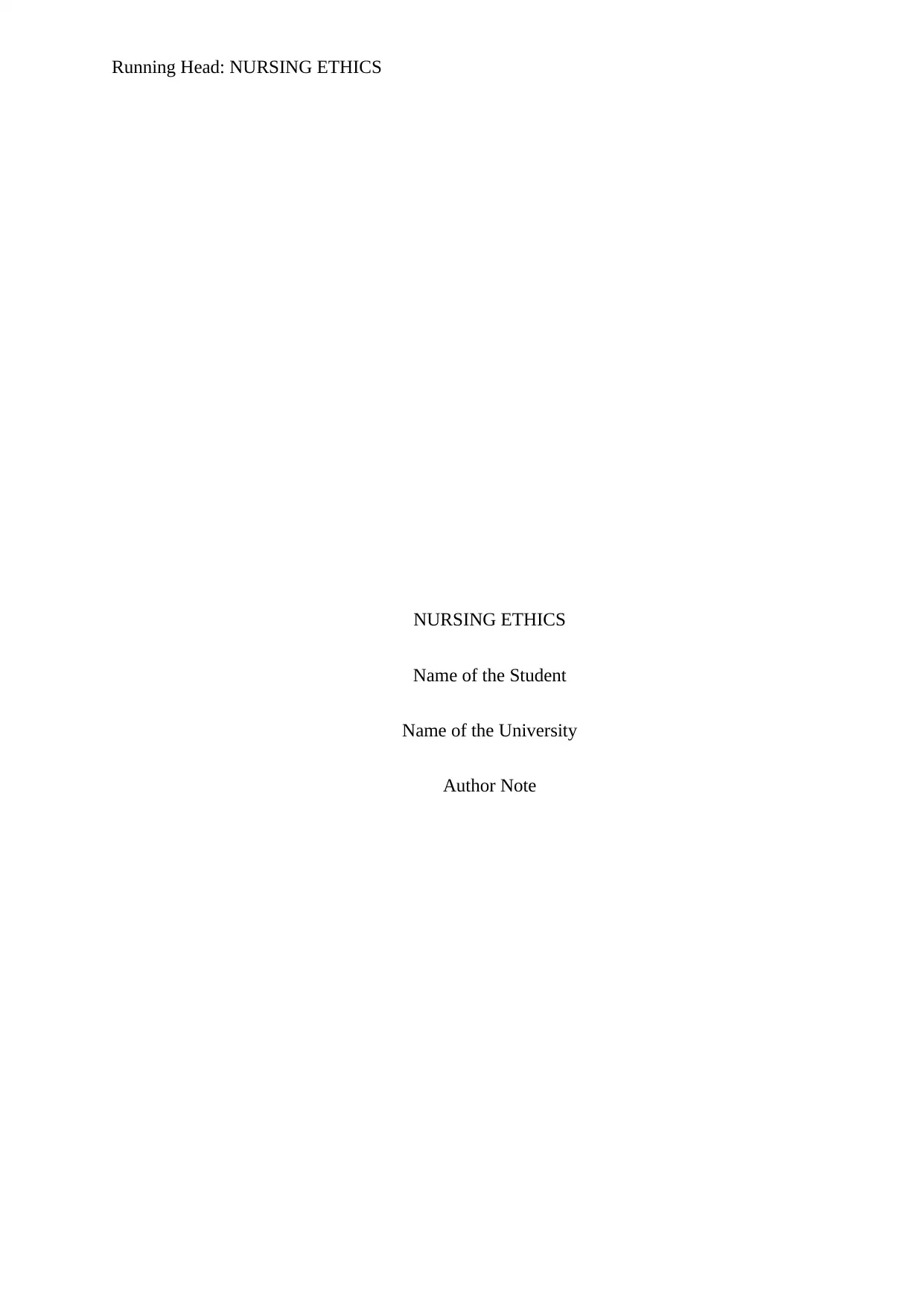
Running Head: NURSING ETHICS
NURSING ETHICS
Name of the Student
Name of the University
Author Note
NURSING ETHICS
Name of the Student
Name of the University
Author Note
Paraphrase This Document
Need a fresh take? Get an instant paraphrase of this document with our AI Paraphraser
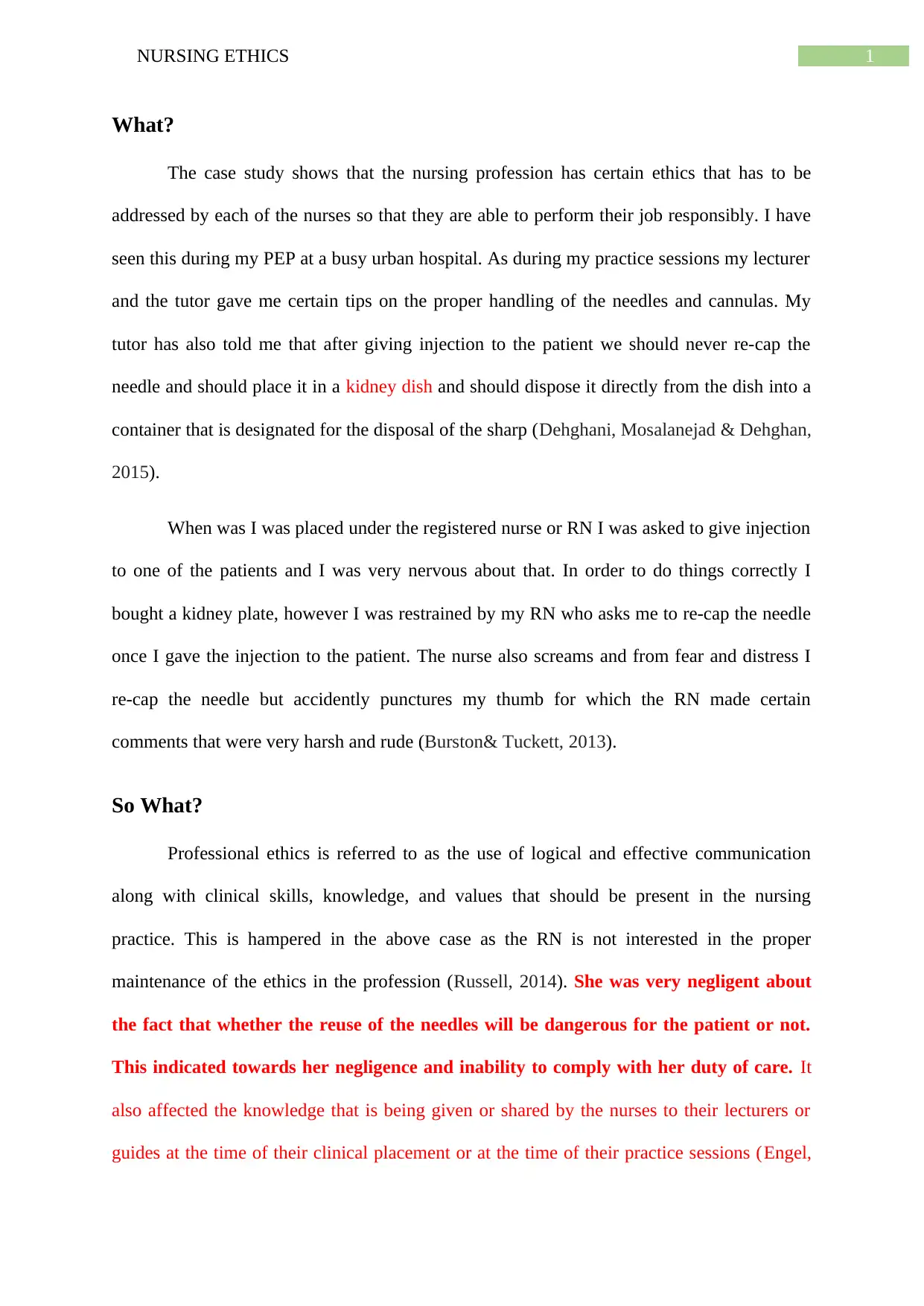
1NURSING ETHICS
What?
The case study shows that the nursing profession has certain ethics that has to be
addressed by each of the nurses so that they are able to perform their job responsibly. I have
seen this during my PEP at a busy urban hospital. As during my practice sessions my lecturer
and the tutor gave me certain tips on the proper handling of the needles and cannulas. My
tutor has also told me that after giving injection to the patient we should never re-cap the
needle and should place it in a kidney dish and should dispose it directly from the dish into a
container that is designated for the disposal of the sharp (Dehghani, Mosalanejad & Dehghan,
2015).
When was I was placed under the registered nurse or RN I was asked to give injection
to one of the patients and I was very nervous about that. In order to do things correctly I
bought a kidney plate, however I was restrained by my RN who asks me to re-cap the needle
once I gave the injection to the patient. The nurse also screams and from fear and distress I
re-cap the needle but accidently punctures my thumb for which the RN made certain
comments that were very harsh and rude (Burston& Tuckett, 2013).
So What?
Professional ethics is referred to as the use of logical and effective communication
along with clinical skills, knowledge, and values that should be present in the nursing
practice. This is hampered in the above case as the RN is not interested in the proper
maintenance of the ethics in the profession (Russell, 2014). She was very negligent about
the fact that whether the reuse of the needles will be dangerous for the patient or not.
This indicated towards her negligence and inability to comply with her duty of care. It
also affected the knowledge that is being given or shared by the nurses to their lecturers or
guides at the time of their clinical placement or at the time of their practice sessions (Engel,
What?
The case study shows that the nursing profession has certain ethics that has to be
addressed by each of the nurses so that they are able to perform their job responsibly. I have
seen this during my PEP at a busy urban hospital. As during my practice sessions my lecturer
and the tutor gave me certain tips on the proper handling of the needles and cannulas. My
tutor has also told me that after giving injection to the patient we should never re-cap the
needle and should place it in a kidney dish and should dispose it directly from the dish into a
container that is designated for the disposal of the sharp (Dehghani, Mosalanejad & Dehghan,
2015).
When was I was placed under the registered nurse or RN I was asked to give injection
to one of the patients and I was very nervous about that. In order to do things correctly I
bought a kidney plate, however I was restrained by my RN who asks me to re-cap the needle
once I gave the injection to the patient. The nurse also screams and from fear and distress I
re-cap the needle but accidently punctures my thumb for which the RN made certain
comments that were very harsh and rude (Burston& Tuckett, 2013).
So What?
Professional ethics is referred to as the use of logical and effective communication
along with clinical skills, knowledge, and values that should be present in the nursing
practice. This is hampered in the above case as the RN is not interested in the proper
maintenance of the ethics in the profession (Russell, 2014). She was very negligent about
the fact that whether the reuse of the needles will be dangerous for the patient or not.
This indicated towards her negligence and inability to comply with her duty of care. It
also affected the knowledge that is being given or shared by the nurses to their lecturers or
guides at the time of their clinical placement or at the time of their practice sessions (Engel,
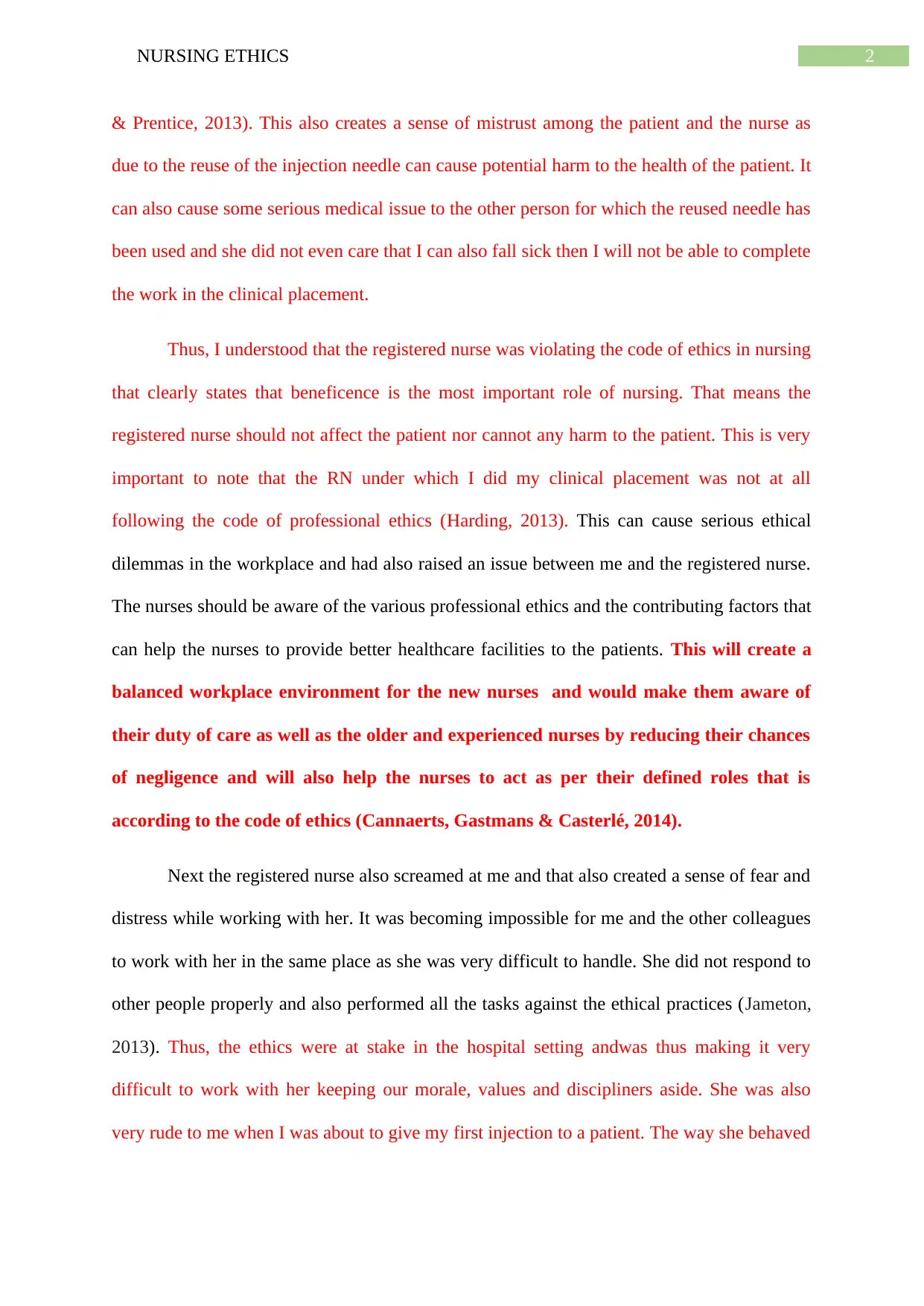
2NURSING ETHICS
& Prentice, 2013). This also creates a sense of mistrust among the patient and the nurse as
due to the reuse of the injection needle can cause potential harm to the health of the patient. It
can also cause some serious medical issue to the other person for which the reused needle has
been used and she did not even care that I can also fall sick then I will not be able to complete
the work in the clinical placement.
Thus, I understood that the registered nurse was violating the code of ethics in nursing
that clearly states that beneficence is the most important role of nursing. That means the
registered nurse should not affect the patient nor cannot any harm to the patient. This is very
important to note that the RN under which I did my clinical placement was not at all
following the code of professional ethics (Harding, 2013). This can cause serious ethical
dilemmas in the workplace and had also raised an issue between me and the registered nurse.
The nurses should be aware of the various professional ethics and the contributing factors that
can help the nurses to provide better healthcare facilities to the patients. This will create a
balanced workplace environment for the new nurses and would make them aware of
their duty of care as well as the older and experienced nurses by reducing their chances
of negligence and will also help the nurses to act as per their defined roles that is
according to the code of ethics (Cannaerts, Gastmans & Casterlé, 2014).
Next the registered nurse also screamed at me and that also created a sense of fear and
distress while working with her. It was becoming impossible for me and the other colleagues
to work with her in the same place as she was very difficult to handle. She did not respond to
other people properly and also performed all the tasks against the ethical practices (Jameton,
2013). Thus, the ethics were at stake in the hospital setting andwas thus making it very
difficult to work with her keeping our morale, values and discipliners aside. She was also
very rude to me when I was about to give my first injection to a patient. The way she behaved
& Prentice, 2013). This also creates a sense of mistrust among the patient and the nurse as
due to the reuse of the injection needle can cause potential harm to the health of the patient. It
can also cause some serious medical issue to the other person for which the reused needle has
been used and she did not even care that I can also fall sick then I will not be able to complete
the work in the clinical placement.
Thus, I understood that the registered nurse was violating the code of ethics in nursing
that clearly states that beneficence is the most important role of nursing. That means the
registered nurse should not affect the patient nor cannot any harm to the patient. This is very
important to note that the RN under which I did my clinical placement was not at all
following the code of professional ethics (Harding, 2013). This can cause serious ethical
dilemmas in the workplace and had also raised an issue between me and the registered nurse.
The nurses should be aware of the various professional ethics and the contributing factors that
can help the nurses to provide better healthcare facilities to the patients. This will create a
balanced workplace environment for the new nurses and would make them aware of
their duty of care as well as the older and experienced nurses by reducing their chances
of negligence and will also help the nurses to act as per their defined roles that is
according to the code of ethics (Cannaerts, Gastmans & Casterlé, 2014).
Next the registered nurse also screamed at me and that also created a sense of fear and
distress while working with her. It was becoming impossible for me and the other colleagues
to work with her in the same place as she was very difficult to handle. She did not respond to
other people properly and also performed all the tasks against the ethical practices (Jameton,
2013). Thus, the ethics were at stake in the hospital setting andwas thus making it very
difficult to work with her keeping our morale, values and discipliners aside. She was also
very rude to me when I was about to give my first injection to a patient. The way she behaved
⊘ This is a preview!⊘
Do you want full access?
Subscribe today to unlock all pages.

Trusted by 1+ million students worldwide
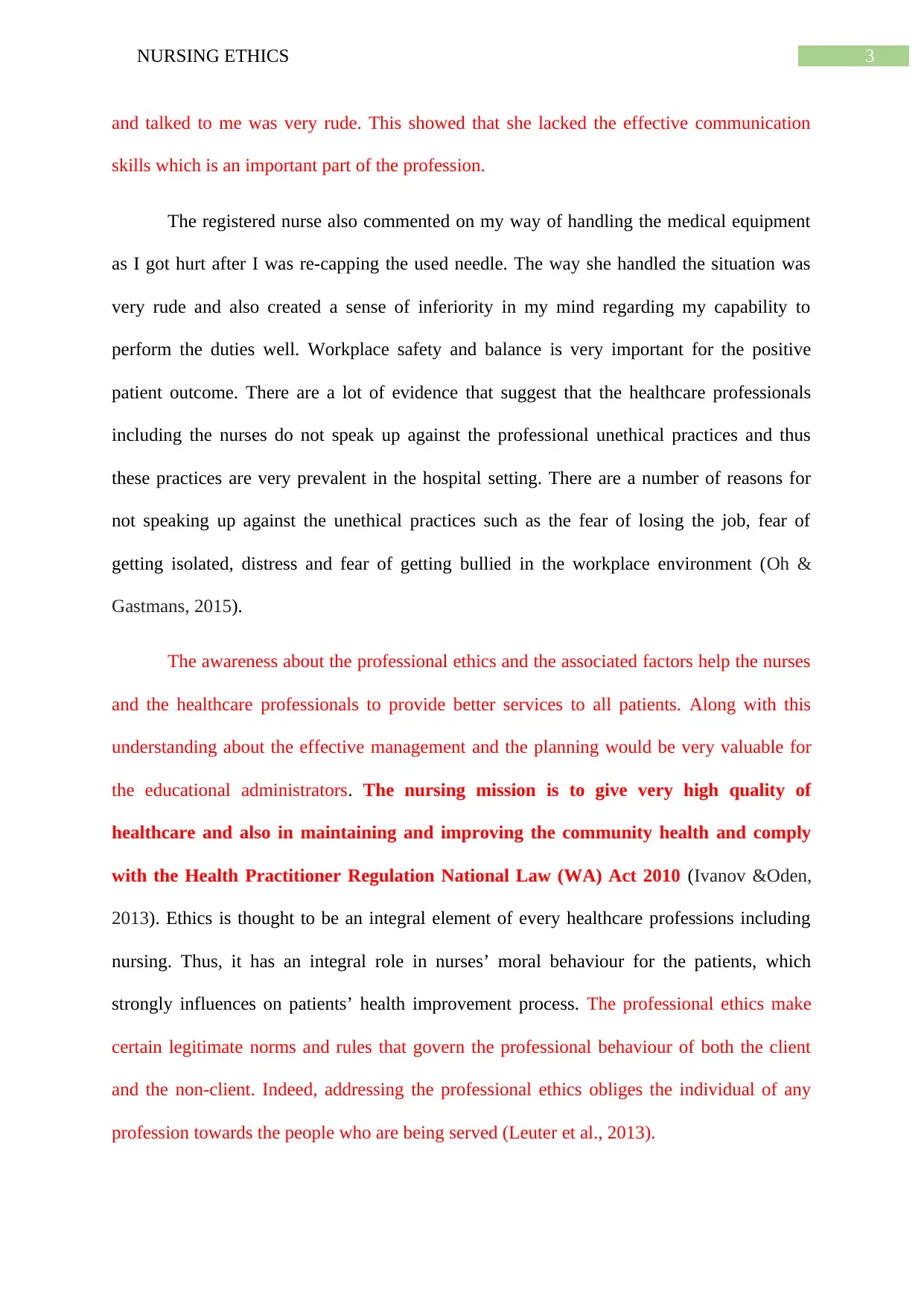
3NURSING ETHICS
and talked to me was very rude. This showed that she lacked the effective communication
skills which is an important part of the profession.
The registered nurse also commented on my way of handling the medical equipment
as I got hurt after I was re-capping the used needle. The way she handled the situation was
very rude and also created a sense of inferiority in my mind regarding my capability to
perform the duties well. Workplace safety and balance is very important for the positive
patient outcome. There are a lot of evidence that suggest that the healthcare professionals
including the nurses do not speak up against the professional unethical practices and thus
these practices are very prevalent in the hospital setting. There are a number of reasons for
not speaking up against the unethical practices such as the fear of losing the job, fear of
getting isolated, distress and fear of getting bullied in the workplace environment (Oh &
Gastmans, 2015).
The awareness about the professional ethics and the associated factors help the nurses
and the healthcare professionals to provide better services to all patients. Along with this
understanding about the effective management and the planning would be very valuable for
the educational administrators. The nursing mission is to give very high quality of
healthcare and also in maintaining and improving the community health and comply
with the Health Practitioner Regulation National Law (WA) Act 2010 (Ivanov &Oden,
2013). Ethics is thought to be an integral element of every healthcare professions including
nursing. Thus, it has an integral role in nurses’ moral behaviour for the patients, which
strongly influences on patients’ health improvement process. The professional ethics make
certain legitimate norms and rules that govern the professional behaviour of both the client
and the non-client. Indeed, addressing the professional ethics obliges the individual of any
profession towards the people who are being served (Leuter et al., 2013).
and talked to me was very rude. This showed that she lacked the effective communication
skills which is an important part of the profession.
The registered nurse also commented on my way of handling the medical equipment
as I got hurt after I was re-capping the used needle. The way she handled the situation was
very rude and also created a sense of inferiority in my mind regarding my capability to
perform the duties well. Workplace safety and balance is very important for the positive
patient outcome. There are a lot of evidence that suggest that the healthcare professionals
including the nurses do not speak up against the professional unethical practices and thus
these practices are very prevalent in the hospital setting. There are a number of reasons for
not speaking up against the unethical practices such as the fear of losing the job, fear of
getting isolated, distress and fear of getting bullied in the workplace environment (Oh &
Gastmans, 2015).
The awareness about the professional ethics and the associated factors help the nurses
and the healthcare professionals to provide better services to all patients. Along with this
understanding about the effective management and the planning would be very valuable for
the educational administrators. The nursing mission is to give very high quality of
healthcare and also in maintaining and improving the community health and comply
with the Health Practitioner Regulation National Law (WA) Act 2010 (Ivanov &Oden,
2013). Ethics is thought to be an integral element of every healthcare professions including
nursing. Thus, it has an integral role in nurses’ moral behaviour for the patients, which
strongly influences on patients’ health improvement process. The professional ethics make
certain legitimate norms and rules that govern the professional behaviour of both the client
and the non-client. Indeed, addressing the professional ethics obliges the individual of any
profession towards the people who are being served (Leuter et al., 2013).
Paraphrase This Document
Need a fresh take? Get an instant paraphrase of this document with our AI Paraphraser
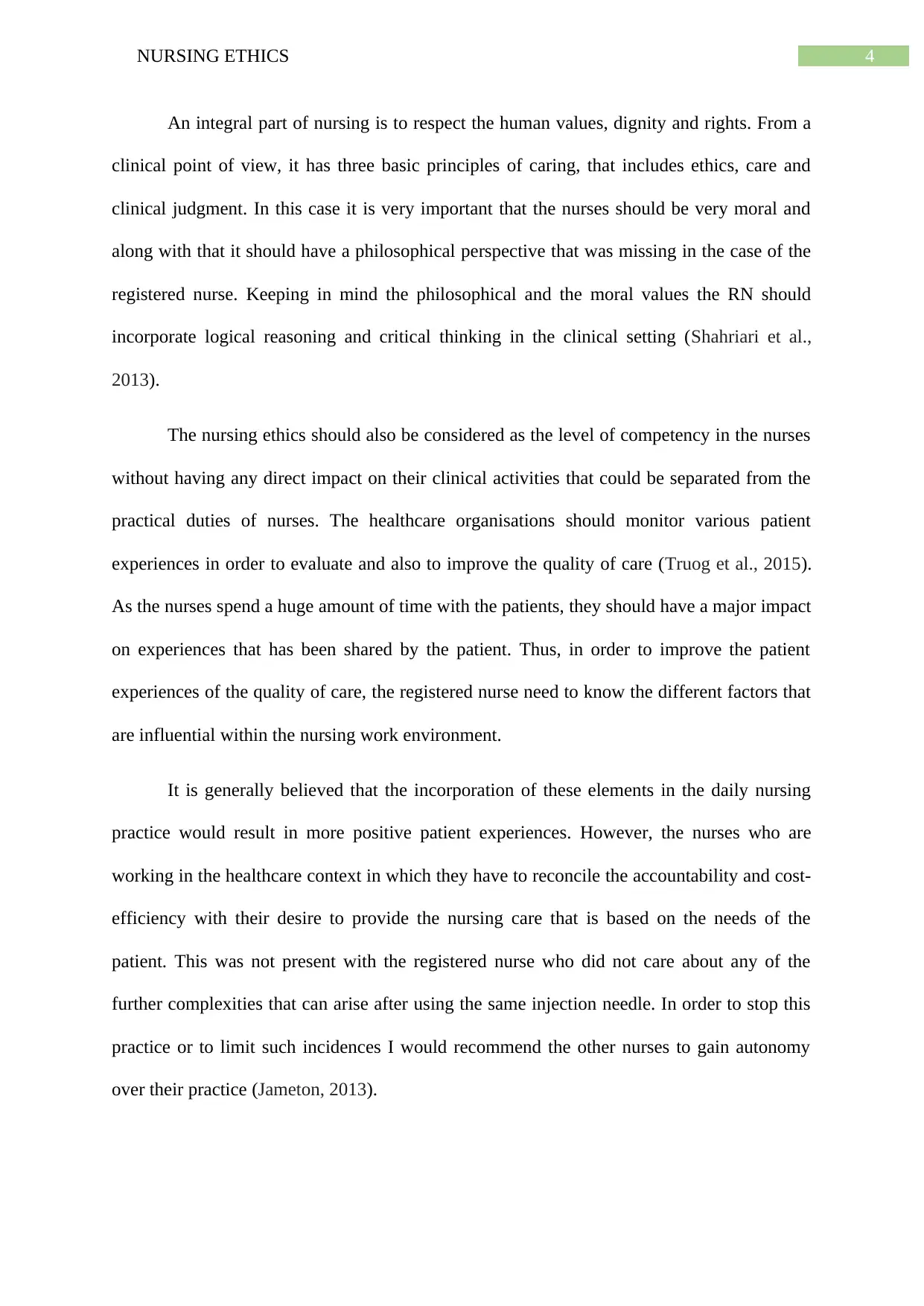
4NURSING ETHICS
An integral part of nursing is to respect the human values, dignity and rights. From a
clinical point of view, it has three basic principles of caring, that includes ethics, care and
clinical judgment. In this case it is very important that the nurses should be very moral and
along with that it should have a philosophical perspective that was missing in the case of the
registered nurse. Keeping in mind the philosophical and the moral values the RN should
incorporate logical reasoning and critical thinking in the clinical setting (Shahriari et al.,
2013).
The nursing ethics should also be considered as the level of competency in the nurses
without having any direct impact on their clinical activities that could be separated from the
practical duties of nurses. The healthcare organisations should monitor various patient
experiences in order to evaluate and also to improve the quality of care (Truog et al., 2015).
As the nurses spend a huge amount of time with the patients, they should have a major impact
on experiences that has been shared by the patient. Thus, in order to improve the patient
experiences of the quality of care, the registered nurse need to know the different factors that
are influential within the nursing work environment.
It is generally believed that the incorporation of these elements in the daily nursing
practice would result in more positive patient experiences. However, the nurses who are
working in the healthcare context in which they have to reconcile the accountability and cost-
efficiency with their desire to provide the nursing care that is based on the needs of the
patient. This was not present with the registered nurse who did not care about any of the
further complexities that can arise after using the same injection needle. In order to stop this
practice or to limit such incidences I would recommend the other nurses to gain autonomy
over their practice (Jameton, 2013).
An integral part of nursing is to respect the human values, dignity and rights. From a
clinical point of view, it has three basic principles of caring, that includes ethics, care and
clinical judgment. In this case it is very important that the nurses should be very moral and
along with that it should have a philosophical perspective that was missing in the case of the
registered nurse. Keeping in mind the philosophical and the moral values the RN should
incorporate logical reasoning and critical thinking in the clinical setting (Shahriari et al.,
2013).
The nursing ethics should also be considered as the level of competency in the nurses
without having any direct impact on their clinical activities that could be separated from the
practical duties of nurses. The healthcare organisations should monitor various patient
experiences in order to evaluate and also to improve the quality of care (Truog et al., 2015).
As the nurses spend a huge amount of time with the patients, they should have a major impact
on experiences that has been shared by the patient. Thus, in order to improve the patient
experiences of the quality of care, the registered nurse need to know the different factors that
are influential within the nursing work environment.
It is generally believed that the incorporation of these elements in the daily nursing
practice would result in more positive patient experiences. However, the nurses who are
working in the healthcare context in which they have to reconcile the accountability and cost-
efficiency with their desire to provide the nursing care that is based on the needs of the
patient. This was not present with the registered nurse who did not care about any of the
further complexities that can arise after using the same injection needle. In order to stop this
practice or to limit such incidences I would recommend the other nurses to gain autonomy
over their practice (Jameton, 2013).
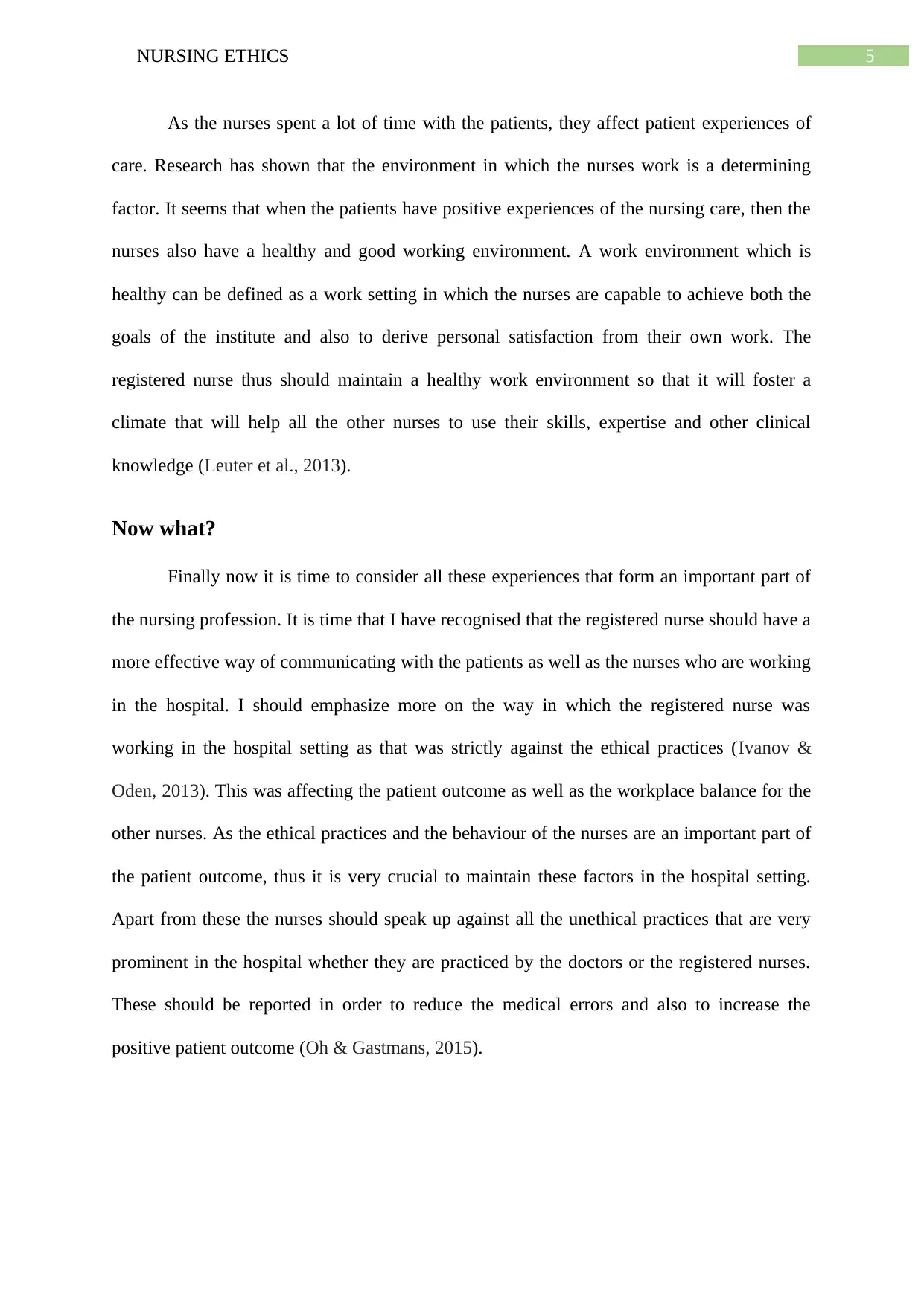
5NURSING ETHICS
As the nurses spent a lot of time with the patients, they affect patient experiences of
care. Research has shown that the environment in which the nurses work is a determining
factor. It seems that when the patients have positive experiences of the nursing care, then the
nurses also have a healthy and good working environment. A work environment which is
healthy can be defined as a work setting in which the nurses are capable to achieve both the
goals of the institute and also to derive personal satisfaction from their own work. The
registered nurse thus should maintain a healthy work environment so that it will foster a
climate that will help all the other nurses to use their skills, expertise and other clinical
knowledge (Leuter et al., 2013).
Now what?
Finally now it is time to consider all these experiences that form an important part of
the nursing profession. It is time that I have recognised that the registered nurse should have a
more effective way of communicating with the patients as well as the nurses who are working
in the hospital. I should emphasize more on the way in which the registered nurse was
working in the hospital setting as that was strictly against the ethical practices (Ivanov &
Oden, 2013). This was affecting the patient outcome as well as the workplace balance for the
other nurses. As the ethical practices and the behaviour of the nurses are an important part of
the patient outcome, thus it is very crucial to maintain these factors in the hospital setting.
Apart from these the nurses should speak up against all the unethical practices that are very
prominent in the hospital whether they are practiced by the doctors or the registered nurses.
These should be reported in order to reduce the medical errors and also to increase the
positive patient outcome (Oh & Gastmans, 2015).
As the nurses spent a lot of time with the patients, they affect patient experiences of
care. Research has shown that the environment in which the nurses work is a determining
factor. It seems that when the patients have positive experiences of the nursing care, then the
nurses also have a healthy and good working environment. A work environment which is
healthy can be defined as a work setting in which the nurses are capable to achieve both the
goals of the institute and also to derive personal satisfaction from their own work. The
registered nurse thus should maintain a healthy work environment so that it will foster a
climate that will help all the other nurses to use their skills, expertise and other clinical
knowledge (Leuter et al., 2013).
Now what?
Finally now it is time to consider all these experiences that form an important part of
the nursing profession. It is time that I have recognised that the registered nurse should have a
more effective way of communicating with the patients as well as the nurses who are working
in the hospital. I should emphasize more on the way in which the registered nurse was
working in the hospital setting as that was strictly against the ethical practices (Ivanov &
Oden, 2013). This was affecting the patient outcome as well as the workplace balance for the
other nurses. As the ethical practices and the behaviour of the nurses are an important part of
the patient outcome, thus it is very crucial to maintain these factors in the hospital setting.
Apart from these the nurses should speak up against all the unethical practices that are very
prominent in the hospital whether they are practiced by the doctors or the registered nurses.
These should be reported in order to reduce the medical errors and also to increase the
positive patient outcome (Oh & Gastmans, 2015).
⊘ This is a preview!⊘
Do you want full access?
Subscribe today to unlock all pages.

Trusted by 1+ million students worldwide
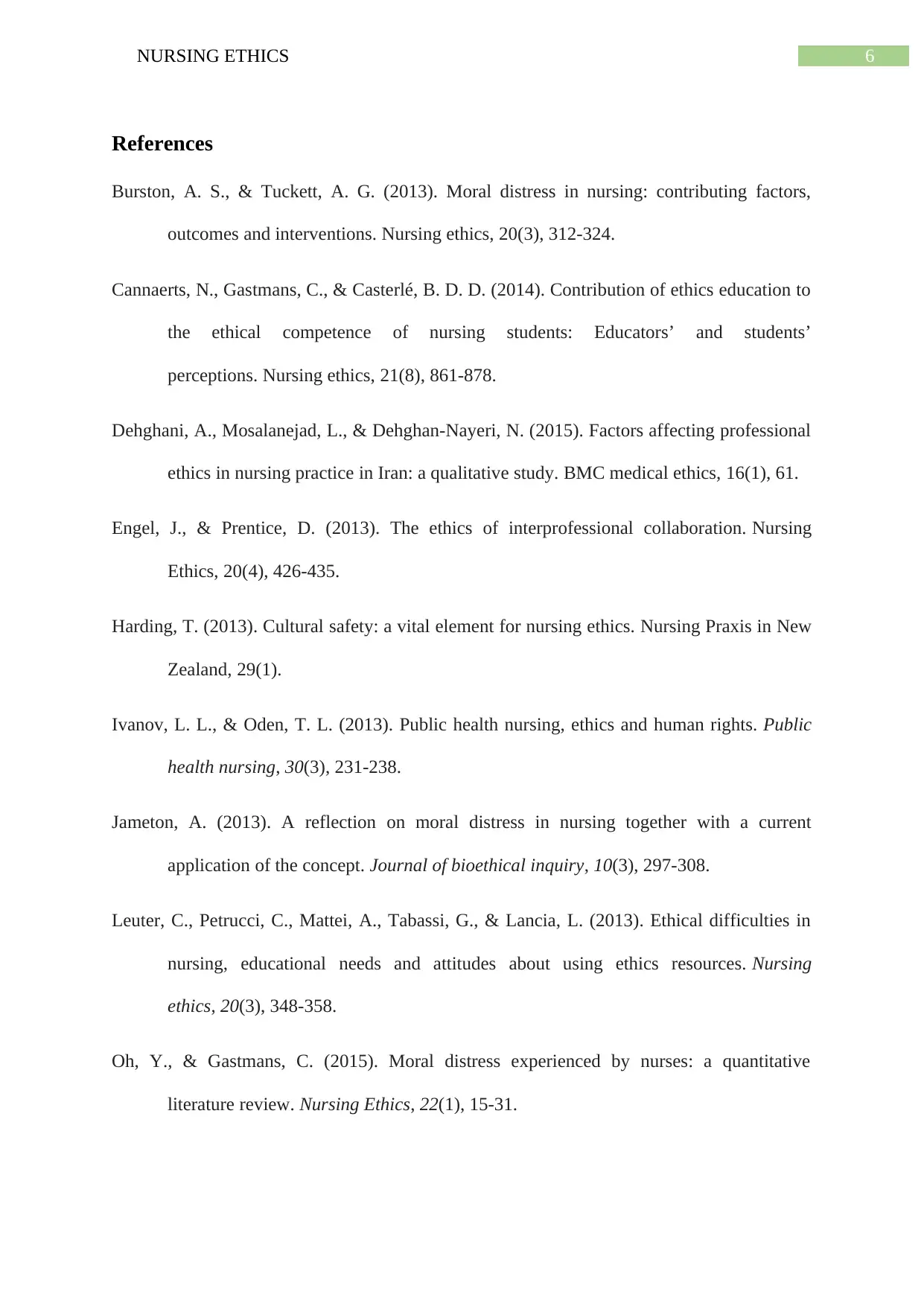
6NURSING ETHICS
References
Burston, A. S., & Tuckett, A. G. (2013). Moral distress in nursing: contributing factors,
outcomes and interventions. Nursing ethics, 20(3), 312-324.
Cannaerts, N., Gastmans, C., & Casterlé, B. D. D. (2014). Contribution of ethics education to
the ethical competence of nursing students: Educators’ and students’
perceptions. Nursing ethics, 21(8), 861-878.
Dehghani, A., Mosalanejad, L., & Dehghan-Nayeri, N. (2015). Factors affecting professional
ethics in nursing practice in Iran: a qualitative study. BMC medical ethics, 16(1), 61.
Engel, J., & Prentice, D. (2013). The ethics of interprofessional collaboration. Nursing
Ethics, 20(4), 426-435.
Harding, T. (2013). Cultural safety: a vital element for nursing ethics. Nursing Praxis in New
Zealand, 29(1).
Ivanov, L. L., & Oden, T. L. (2013). Public health nursing, ethics and human rights. Public
health nursing, 30(3), 231-238.
Jameton, A. (2013). A reflection on moral distress in nursing together with a current
application of the concept. Journal of bioethical inquiry, 10(3), 297-308.
Leuter, C., Petrucci, C., Mattei, A., Tabassi, G., & Lancia, L. (2013). Ethical difficulties in
nursing, educational needs and attitudes about using ethics resources. Nursing
ethics, 20(3), 348-358.
Oh, Y., & Gastmans, C. (2015). Moral distress experienced by nurses: a quantitative
literature review. Nursing Ethics, 22(1), 15-31.
References
Burston, A. S., & Tuckett, A. G. (2013). Moral distress in nursing: contributing factors,
outcomes and interventions. Nursing ethics, 20(3), 312-324.
Cannaerts, N., Gastmans, C., & Casterlé, B. D. D. (2014). Contribution of ethics education to
the ethical competence of nursing students: Educators’ and students’
perceptions. Nursing ethics, 21(8), 861-878.
Dehghani, A., Mosalanejad, L., & Dehghan-Nayeri, N. (2015). Factors affecting professional
ethics in nursing practice in Iran: a qualitative study. BMC medical ethics, 16(1), 61.
Engel, J., & Prentice, D. (2013). The ethics of interprofessional collaboration. Nursing
Ethics, 20(4), 426-435.
Harding, T. (2013). Cultural safety: a vital element for nursing ethics. Nursing Praxis in New
Zealand, 29(1).
Ivanov, L. L., & Oden, T. L. (2013). Public health nursing, ethics and human rights. Public
health nursing, 30(3), 231-238.
Jameton, A. (2013). A reflection on moral distress in nursing together with a current
application of the concept. Journal of bioethical inquiry, 10(3), 297-308.
Leuter, C., Petrucci, C., Mattei, A., Tabassi, G., & Lancia, L. (2013). Ethical difficulties in
nursing, educational needs and attitudes about using ethics resources. Nursing
ethics, 20(3), 348-358.
Oh, Y., & Gastmans, C. (2015). Moral distress experienced by nurses: a quantitative
literature review. Nursing Ethics, 22(1), 15-31.
Paraphrase This Document
Need a fresh take? Get an instant paraphrase of this document with our AI Paraphraser
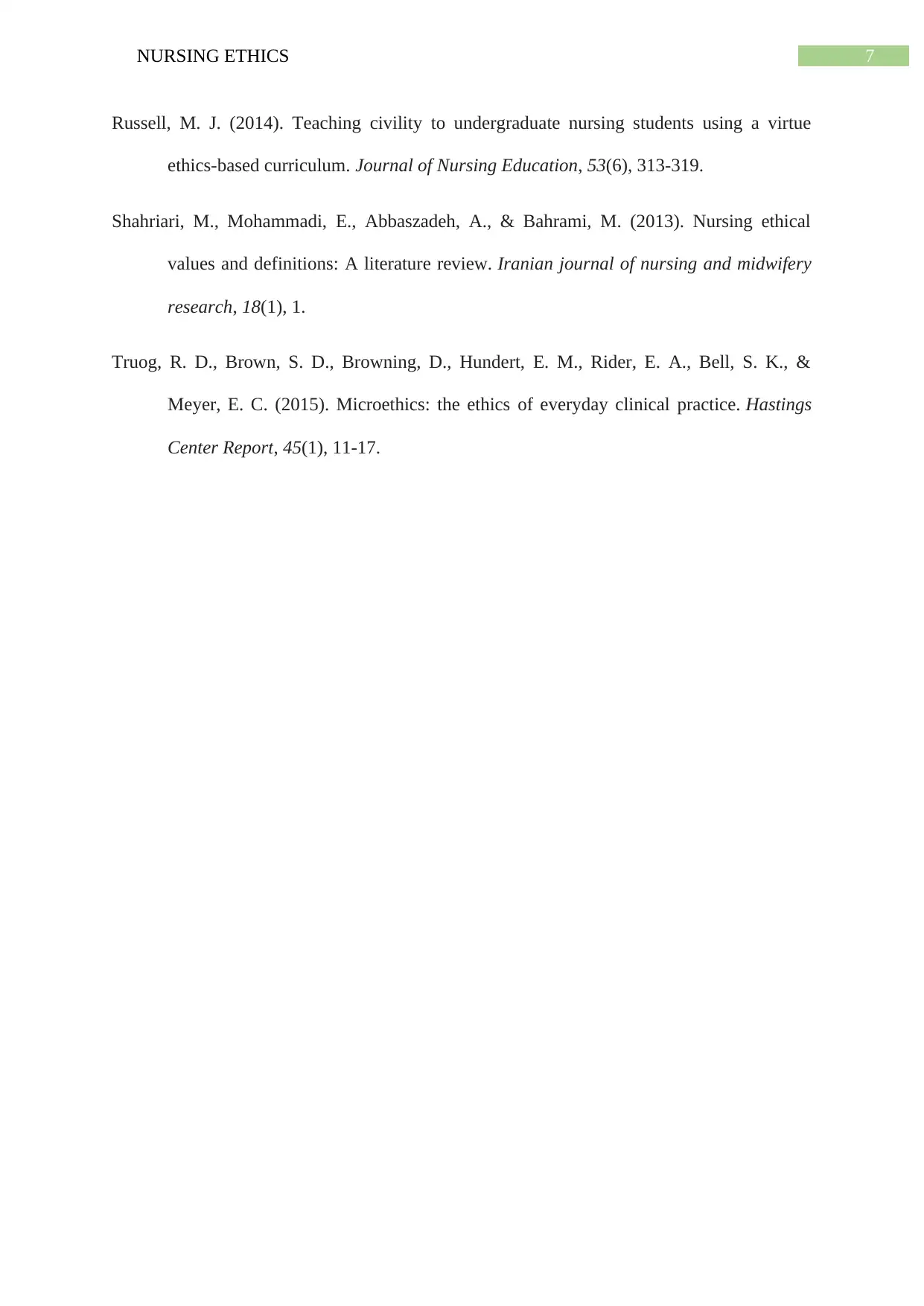
7NURSING ETHICS
Russell, M. J. (2014). Teaching civility to undergraduate nursing students using a virtue
ethics-based curriculum. Journal of Nursing Education, 53(6), 313-319.
Shahriari, M., Mohammadi, E., Abbaszadeh, A., & Bahrami, M. (2013). Nursing ethical
values and definitions: A literature review. Iranian journal of nursing and midwifery
research, 18(1), 1.
Truog, R. D., Brown, S. D., Browning, D., Hundert, E. M., Rider, E. A., Bell, S. K., &
Meyer, E. C. (2015). Microethics: the ethics of everyday clinical practice. Hastings
Center Report, 45(1), 11-17.
Russell, M. J. (2014). Teaching civility to undergraduate nursing students using a virtue
ethics-based curriculum. Journal of Nursing Education, 53(6), 313-319.
Shahriari, M., Mohammadi, E., Abbaszadeh, A., & Bahrami, M. (2013). Nursing ethical
values and definitions: A literature review. Iranian journal of nursing and midwifery
research, 18(1), 1.
Truog, R. D., Brown, S. D., Browning, D., Hundert, E. M., Rider, E. A., Bell, S. K., &
Meyer, E. C. (2015). Microethics: the ethics of everyday clinical practice. Hastings
Center Report, 45(1), 11-17.
1 out of 8
Related Documents
Your All-in-One AI-Powered Toolkit for Academic Success.
+13062052269
info@desklib.com
Available 24*7 on WhatsApp / Email
![[object Object]](/_next/static/media/star-bottom.7253800d.svg)
Unlock your academic potential
Copyright © 2020–2026 A2Z Services. All Rights Reserved. Developed and managed by ZUCOL.





